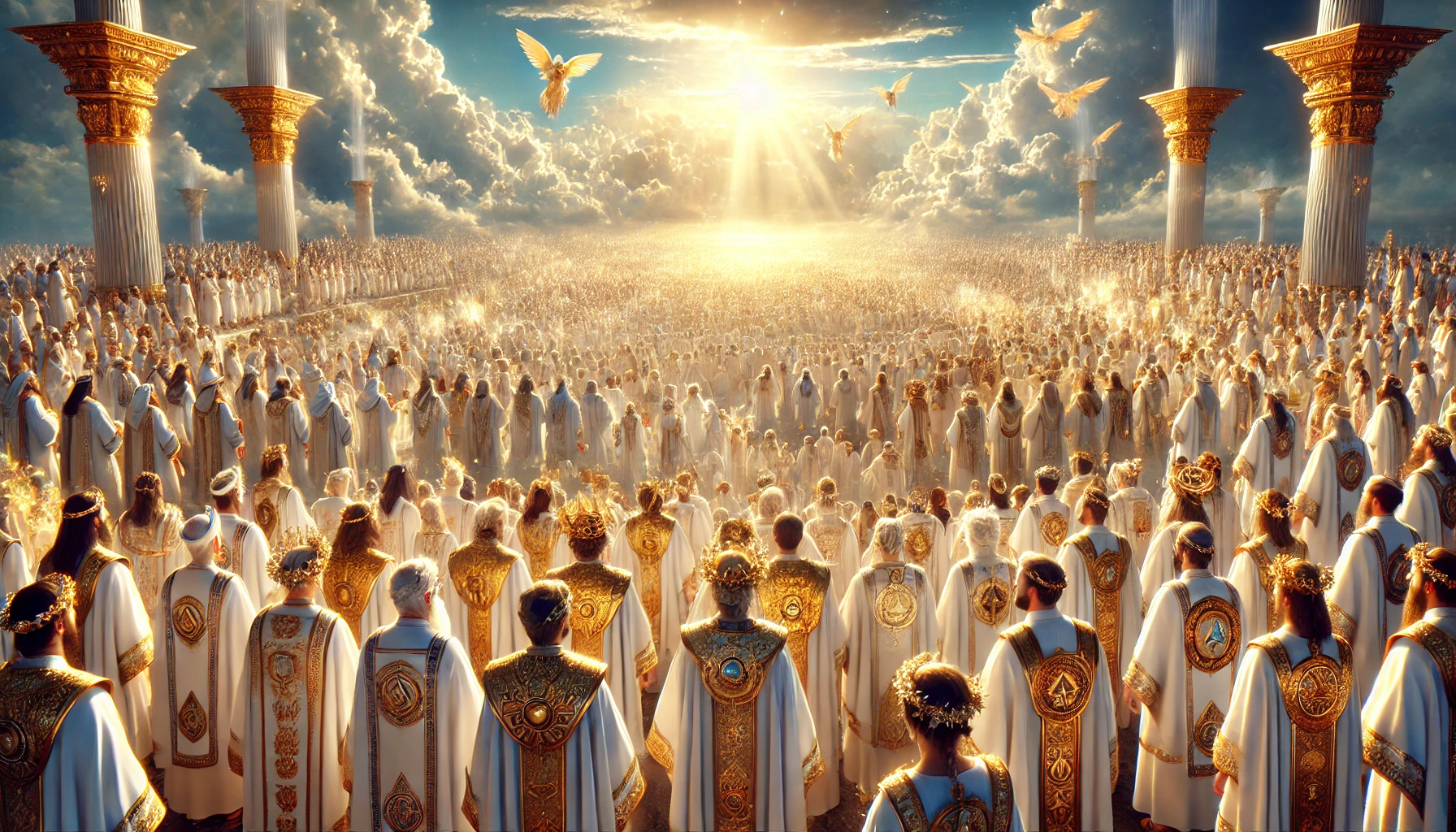Beliefs and doctrines of faith in some congregations, although well-intentioned, are often not based on God’s Word. For example, some religious movements were established by charismatic leaders who had a vision or dream that motivated them to start such a work. Others built their religious empires on deceit, while others were fully convinced they were guided by God. Most believe, without a doubt, that their work is supported by God because it has grown, they collect large sums of money in offerings and tithes, and they have built one or several buildings for gatherings, both locally and internationally. It never crosses their minds that they could be wrong—not in any way! They believe they have proof that they are acting according to God’s will because their works remain standing and continue to grow.
Preaching and teachings in their congregations are sometimes based on the beliefs and customs of their so-called spiritual fathers. These doctrines have shaped thousands, perhaps millions, of Christians eager to receive God’s Word. Now these people are convinced that they will be raptured at any moment, that they do not need to do good works for the poor or help those in need, and much less that they should suffer for Christ. Some Christians believe that even if they sin constantly, their salvation and relationship with God will not be affected. For them, all Christians are saved and will always be saved, no matter what they do.
However, Scripture says that those who sin are children of the devil. See what 1 John 3:8 says. If God’s Word states that fornication is a very serious sin, we must not “reason” whether we should fornicate or not; we must simply obey, as breaking this law will have eternal consequences. Sinning is disobeying God’s commandments, no matter which commandment it is. But it’s not just that—God’s Word also says that sin is failing to do good. “If anyone, then, knows the good they ought to do and doesn’t do it, it is sin for them.” James 4:17.
John tells us that we must not only obey God’s commandments but also do what pleases God. In 1 John 3:22, Scripture says: “and receive from him anything we ask, because we keep his commands and do what pleases him.”
By keeping His commandments and striving to please Him, we can receive a reward, which God will give to each one according to their effort. “Look, I am coming soon! My reward is with me, and I will give to each person according to what they have done.” Revelation 22:12. Many leaders preach that all Christians are equal before God and that He treats everyone the same. However, the previous statement confirms that this is not so. He comes to reward each one ACCORDING to their work. This indicates that we are not all the same before God; the difference in how God will treat us, in terms of punishment and rewards, is made by us.
The Bible says that God does not show favoritism. See Acts 10:34, Romans 2:11, Galatians 2:6-7, Ephesians 6:9, Colossians 3:25, James 2:1, and James 2:9. In 1 Peter 1:17, it says: “Since you call on a Father who judges each person’s work impartially, live out your time as foreigners here in reverent fear.” Not showing favoritism means that God does not exclude anyone. On the contrary, showing favoritism means excluding someone from something. Here, Scripture clearly says that God does not exclude anyone from the opportunity to be saved and live eternally, nor does He exempt anyone from judgment on the last day, when both Christians and unbelievers will give an account of all their deeds. Peter is saying that God judges people without favoritism according to what they do. I repeat again, God will judge us.
Paul wrote a letter to the brothers in Rome, explaining that God’s wrath comes upon all men, regardless of whether they are Jews or Gentiles. God will punish as well as reward men, regardless of whether they are Jews or Gentiles, Christians or unbelievers. On the day of judgment, all men will give an account of all their deeds.
All human beings, without exception, will be judged by God. In that judgment, He will both condemn and reward each one according to their deeds. In the Epistle to the Romans, chapter 2, verses 4 through 11, Paul explains God’s justice:
“But because of your stubbornness and your unrepentant heart, you are storing up wrath against yourself for the day of God’s wrath, when his righteous judgment will be revealed. God ‘will repay each person according to what they have done.’ To those who by persistence in doing good seek glory, honor, and immortality, he will give eternal life. But for those who are self-seeking and who reject the truth and follow evil, there will be wrath and anger. There will be trouble and distress for every human being who does evil: first for the Jew, then for the Gentile; but glory, honor, and peace for everyone who does good: first for the Jew, then for the Gentile. For God does not show favoritism.” Romans 2:4-11
God’s judgment will reach all men, not just unbelievers, as many believe. Both Paul and the writer of the book of Hebrews wrote to the church of God—that is, to evangelical Christians—to proclaim that God is just and will not exclude anyone from His judgments. He will both condemn and reward Jews, Greeks, and Gentiles. All of us will be judged fairly.
I do not understand how modern Christians can ignore God’s Word and think that the church is exempt from judgment. The writer of the book of Hebrews, chapter 9, verse 27, confirms that mankind must and will be judged by God:
“Just as people are destined to die once, and after that to face judgment.” Hebrews 9:27
The Father delights in His children being obedient, honoring Him, and keeping His commandments. Any effort to fulfill His will shall be rewarded when Jesus returns to establish His Kingdom on earth. Colossians 3:23-25 says:
“Whatever you do, work at it with all your heart, as working for the Lord, not for human masters, since you know that you will receive an inheritance from the Lord as a reward. It is the Lord Christ you are serving. Anyone who does wrong will be repaid for their wrongs, and there is no favoritism.”
All our actions, whether good or bad, have consequences. The good we do for the Lord brings an inheritance as a reward, while injustice brings punishment. Every good deed we do for God and His servants will not go unrewarded:
“Whoever welcomes a prophet as a prophet will receive a prophet’s reward, and whoever welcomes a righteous person as a righteous person will receive a righteous person’s reward. And if anyone gives even a cup of cold water to one of these little ones who is my disciple, truly I tell you, that person will certainly not lose their reward.” Matthew 10:41-42
If we do good to His servants, even in small ways, God will reward us. However, we must pay attention to this detail: God refers to “HIS PROPHETS AND HIS DISCIPLES,” not to everyone who claims to be a servant of God but is not. Thus, the rewards do not apply to following false prophets and apostles who claim to represent God but act according to Satan. Therefore, everything good we do for our neighbor, maintaining righteousness and holiness, will have its reward in heaven. If we do the opposite, the only thing awaiting us is the rightful payment for our disobedience.
The Race of Faith is a Marathon.
The Christian race is often used to refer to steadfastness or perseverance in the doctrine of a particular denomination. Emphasis is placed on attending meetings, arguing that we must not stop gathering together. For some congregations, the race of faith is reduced to attending the place where they gather.
The leaders in these congregations call themselves your spiritual covering or immediate authority. They take upon themselves the responsibility of directing your spiritual life and that of the entire congregation’s membership. But not only that, they also determine what kind of Christian you are. They evaluate your spiritual stature using specific parameters, for example, whether you faithfully attend midweek meetings and especially Sunday worship services. If you tithe and give offerings consistently, you earn additional points, which might even allow you to be called faithful in little, and therefore qualified to hold a position of authority within the congregation, such as collecting offerings or welcoming attendees with a handshake and a hug. All of this is conditional upon respecting and strictly adhering to all the organization’s statutes.
These leaders become your judges, as they determine, based on purely external aspects, what kind of Christian you are. This is how a man or a group of men decide who is a good or bad Christian.
Now, if we consider the lives of some men of faith who did not walk according to religious standards but according to God’s will, we will see significant changes in how they lived their lives in religious terms. Take, for example, the life of a man of faith whose ministry was none other than announcing the arrival of the promised Messiah. Even though his ministry was one of the shortest in history, it was effectively one of the most powerful of all time. Jesus referred to him as the greatest of all men born of women:
“I tell you, among those born of women there is no one greater than John; yet the one who is least in the kingdom of God is greater than he.” Luke 7:28.
Now, if we evaluate John the Baptist’s ministry using modern parameters, we might consider it a ministerial failure since he never built a place for his “church,” established a Bible institute, or helped construct an orphanage or anything similar.
Let us also consider that John the Baptist began his ministry from childhood, although it did not conform to the stereotype of the time. Although there were already biblical schools that trained priests and religious leaders like Paul, John chose not to attend any of them. Instead, he preferred to take the Nazirite vow assigned to him by God. Luke 1:15 says: “for he will be great in the sight of the Lord. He is never to take wine or other fermented drink, and he will be filled with the Holy Spirit even before he is born.”
John the Baptist was guided by the Holy Spirit. He grew up isolated from the world, living in a cave in the desert until the age of 30. Today, many would label John a crazy hermit or the leader of some “fanatical sect.” There are no records of what John the Baptist did during his youth; the Word of God only mentions that he lived in the desert and ate wild honey and locusts. Matthew 3:3-5. It is presumed that before his public appearance, he did nothing supernatural or different from what was established at the time.
The years John spent in the desert were the time God used to shape his character. He simply waited for the moment when God would call him to begin his ministry. In our time, such a way of life would be considered a waste of time, something barren that does not bear fruit according to modern standards. John did not need the things that might be considered essential for pastoral ministry, as the presence of the Holy Spirit was sufficient and manifested powerfully in him, something the people of Israel had not experienced for a long time.
It took less than a year for John to draw crowds repentant of their sins and prepared to receive the promised Messiah. The power of God manifested itself in John’s presence and in the words that came from the mouth of the hermit, who had never attended a theological seminary or a Christian university, never graduated as a pastor or prophet, had no credentials qualifying him to lead a congregation, and never congregated in a building made of stones. To graduate from God’s school, he completed his short career when he was beheaded.
If we put it into perspective, and if he had attended any modern denomination, I am sure that he would not have adapted to any of them either. He would be an “outcast” and a “divisionist” who does not conform to the preachings of his pastor. John would be considered a rebel who does not submit to his authorities, and if he had lived in the twenty-first century, he might have been expelled from more than one congregation. John would be labeled a heretic, or perhaps demon-possessed, because he insulted his authorities by calling them: “You brood of vipers!” Matthew 3:7; Luke 3:7. He also did not hesitate to call them “hypocrites” and “whitewashed tombs.”
Moreover, if we compare John the Baptist’s short ministry with the “success” achieved by some famous preacher in 40 years of ministry—one who boasts of having preached the gospel everywhere in the world, met with high-ranking dignitaries, dined with the most influential businessmen, established ministries globally, travels in a private jet, and leads a congregation of thousands—John the Baptist would undoubtedly be considered a failure and a false prophet. What do you think? Would you receive a complete stranger whose words deeply impact your heart, exposing your sin and perhaps offending you, but whom you know deep down is speaking the truth? Or would you look at him suspiciously, believing him to be one of those religious fanatics who appear every day, and reject him? What would your attitude be?
Perhaps thousands would believe he was sent by God, while many others would see him as a religious fanatic. The problem lies in evaluating a person’s ministry—or their life itself—according to worldly standards. If they have many followers, they are a leader. If they have wealth, they are a success. If they have achieved their goals, they are a man of triumph. Jesus said John the Baptist was the greatest prophet who ever lived. Are those credentials not sufficient? Is God’s opinion not more important than that of men?
The Scriptures teach very different standards for God’s servants. Let us look at the following verses that exemplify how a true servant of God should be:
“And what more shall I say? I do not have time to tell about Gideon, Barak, Samson and Jephthah, about David and Samuel and the prophets, who through faith conquered kingdoms, administered justice, and gained what was promised; who shut the mouths of lions, quenched the fury of the flames, and escaped the edge of the sword; whose weakness was turned to strength; and who became powerful in battle and routed foreign armies. Women received back their dead, raised to life again. There were others who were tortured, refusing to be released so that they might gain an even better resurrection. Some faced jeers and flogging, and even chains and imprisonment. They were put to death by stoning; they were sawed in two; they were killed by the sword. They went about in sheepskins and goatskins, destitute, persecuted and mistreated—the world was not worthy of them. They wandered in deserts and mountains, living in caves and in holes in the ground. These were all commended for their faith, yet none of them received what had been promised, since God had planned something better for us so that only together with us would they be made perfect.” Hebrews 11:32-40.
The lives of many of these men, like that of John the Baptist, ended in tragic and violent deaths. However, they earned a good testimony “before God.” Ironically, these men of God were ALWAYS despised and persecuted by humanity. Does that not seem contradictory? Men view God’s servants as threats and seek to silence them; many were tortured and killed simply for obeying God’s commands.
Based on these examples, let us reflect for a moment and ask ourselves: What did these men of God do that we are not doing? Could we consider ourselves comparable to them? Do you believe we will ever become like any of them? Could we, like the Apostle Paul, say: “I do not think I am in the least inferior to those ‘super-apostles.’” 2 Corinthians 11:5.
All Christians have been called by God to do His work on earth. EVERYONE, without exception, has a role to fulfill in the Kingdom of Heaven. Therefore, there is no division between laity and ministers, as ALL of us have been appointed by God to be competent ministers of this new covenant, according to 2 Corinthians 3.
The Christian race has nothing to do with attendance, consistency, or perseverance in a congregation, much less with loyalty to a charismatic leader. The Christian race is about living our lives in the path of truth, even if it means going against the world, and especially against the Christian church itself. When the will of our Heavenly Father is revealed to all Christendom, we will understand that the “Christian race” is to walk in righteousness and truth, adhering to divine precepts, not the statement of faith of our congregation.
The logical result of living a Christian life modeled after Jesus Christ and His apostles will produce love, joy, peace, patience, kindness, goodness, faithfulness, gentleness, and self-control. These virtues were evident in them because they were guided by the Holy Spirit. Our goal should be to cling to the one gospel of the Kingdom preached by Jesus and His apostles, not turning to the left or right but keeping our eyes fixed on the Son of God, regardless of the consequences, which I am sure will come.
Not all Christians will be Kings and Priests.
Millions of believers still think that when they die, they will enter the Lord’s presence, walk the streets of gold, and sit on thrones as Kings and Priests. While it is true that Scripture mentions that God will make for Himself Kings and Priests, it does not mean that all Christians will be in that category. This holy lineage is being formed within Christians through the church. In short, the church of God—the true church of the Lord—is pregnant, waiting for the moment to give birth to the children of God, who will be like the firstborn.
This is clearly seen in the first-century church, as the disciples were so similar to their Master that the people of the world recognized that they had been with Jesus and began calling them Christians. Acts 11:26.
God’s measure, or standard, is His Son, Jesus Christ. All believers are called to attain the stature of the perfect man; we are all called to be like Christ in every way. Ephesians 4:12-14.
God does not settle for anything less than perfection, and that is what He demands of His children. To attain the privilege of being Kings and Priests, the first Christians met certain requirements that we must also fulfill. Let’s consider a few:
1- God’s Election
Although it may sound harsh, the truth is that being part of the group of Kings and Priests does not depend on what we do or how much we desire it, but on whether we are chosen by God or not. If God has not chosen us out of His good pleasure, we will never be part of that privileged group. “For many are invited, but few are chosen.” Matthew 22:14.
The first requirement for becoming a King or Priest is to be chosen by God. God’s election is not based on worldly parameters. As mentioned earlier, Christians often evaluate a servant of God by their achievements or whether they carry credentials from a seminary authorizing them as ministers of the Lord.
However, God looks at the depths of a person’s heart, not their abilities or titles: “But the Lord said to Samuel, ‘Do not consider his appearance or his height, for I have rejected him. The Lord does not look at the things people look at. People look at the outward appearance, but the Lord looks at the heart.’” 1 Samuel 16:7.
The task of choosing Kings and Priests belongs exclusively to God. We cannot influence God’s choice in any way, nor can we know if we are chosen until we come to know God and His will, to the extent that we can proclaim, like Paul: “…there is in store for me the crown of righteousness…” 2 Timothy 4:8.
All the men and women God has chosen were selected before the foundation of the world. They are special because of God’s election. He equips them, shapes them according to the character of His Son, Jesus Christ, and refines them through trials like gold.
These individuals are not taller or more beautiful than others, but they bear within themselves the image of their Father in heaven. These chosen ones, indistinguishable from others and often overlooked, will be crowned with glory and majesty, just as Jesus was.
These elect were predestined by God to inherit all things alongside His firstborn Son. Jesus Christ is the first of many brothers who will share life within themselves and have the authority to rule the nations:
“And we know that in all things God works for the good of those who love him, who have been called according to his purpose. For those God foreknew he also predestined to be conformed to the image of his Son, that he might be the firstborn among many brothers and sisters. And those he predestined, he also called; those he called, he also justified; those he justified, he also glorified.” Romans 8:28-30.
No one knows the position they will hold or how much power they will be given, but Scripture says that we will be like Him: “Dear friends, now we are children of God, and what we will be has not yet been made known. But we know that when Christ appears, we shall be like him, for we shall see him as he is.” 1 John 3:2.
2- God’s Training
The children of God went through all kinds of situations, which served to shape their character and demonstrate their love, devotion, and trust in God through their actions. They had to endure everything from verbal insults to violent deaths, facing dangers and extremely difficult circumstances. Reflecting on this, it seems strange, because if these men were in accordance with God’s heart, human logic tells us it should have been the opposite. After all, it is preached today that the children of God should be prosperous and enjoy the abundant blessings of the Heavenly Father.
On the contrary, when a Christian lacks material goods and things seem to go from bad to worse, it is often assumed to be due to some hidden sin that keeps them bound. It is thought that poverty, sickness, and affliction should not be normal among Christians, without considering that the entire Bible says that God’s children are meant to be like His Son and that just as He suffered, we must also suffer.
Paul “rejoiced” in difficult circumstances. He understood that the only way to attain God’s glory is through suffering:
“But he said to me, ‘My grace is sufficient for you, for my power is made perfect in weakness.’ Therefore I will boast all the more gladly about my weaknesses, so that Christ’s power may rest on me. That is why, for Christ’s sake, I delight in weaknesses, in insults, in hardships, in persecutions, in difficulties. For when I am weak, then I am strong. I have made a fool of myself, but you drove me to it. I ought to have been commended by you, for I am not in the least inferior to the ‘super-apostles,’ even though I am nothing.” 2 Corinthians 12:9-11.
Why did God allow servants like David, Isaiah, Job, or Paul to suffer unjustly? Does God love modern Christians more than those of ancient times? Why would a loving Father allow His children to suffer?
These are difficult questions to answer from a human perspective, as they defy logic and seem like unexplainable absurdities. People fail to understand that the more these men were afflicted, the more they pleased God. Persecution, anguish, and need are part of the formation of every faithful servant.
Take Joseph as an example. His brothers intended to kill him but, in an act of mercy, sold him instead. After many years of imprisonment and discouragement, God exalted him to a position that ultimately became a blessing for those who had sought to harm him.
We could cite many examples like Daniel, Jeremiah, Jonah, Isaiah, and many others who are now regarded as “true” servants of God. However, in their time, they were treated as criminals and evildoers. Those who do not know God fail to understand why He allowed these men to suffer to the point of losing their lives. These false teachers do not understand how God works because they have never known Him. They are filled with university titles and eschatological knowledge but lack an understanding of God’s plan for His children.
They evaluate Christians according to worldly standards, failing to realize that God’s approval is the only one that matters. They do not yet understand that Christians must be tested like gold and that needs and hardships are part of that preparation.
The Father wants to form the character of His Son, Jesus Christ, in His church, and He will do so in the same way He did with His only begotten Son—through tribulation:
“Now if we are children, then we are heirs—heirs of God and co-heirs with Christ, if indeed we share in his sufferings in order that we may also share in his glory.” Romans 8:17.
The type of sufferings Paul speaks of are exactly the same ones ALL the apostles and disciples endured. These are not the everyday struggles all humans face, such as paying rent, family problems, the death of a loved one, losing a job, or illness. Instead, they involve suffering for preaching the true gospel of the Kingdom and for doing good:
“Blessed are those who are persecuted because of righteousness, for theirs is the kingdom of heaven.” Matthew 5:10.
Suffering persecution for doing good and preaching the good news of salvation is different from suffering persecution for being a criminal. A Christian who has committed a crime must be pursued by justice to pay for their wrongdoing.
When you are righteous and suffer persecution, it is pleasing to God. This should not be surprising, as Christ warned about it and taught it to His apostles:
“Dear friends, do not be surprised at the fiery ordeal that has come on you to test you, as though something strange were happening to you. But rejoice inasmuch as you participate in the sufferings of Christ, so that you may be overjoyed when his glory is revealed. If you are insulted because of the name of Christ, you are blessed, for the Spirit of glory and of God rests on you. If you suffer, it should not be as a murderer or thief or any other kind of criminal, or even as a meddler. However, if you suffer as a Christian, do not be ashamed, but praise God that you bear that name.” 1 Peter 4:12-16.
God prepares His children through tribulations. Contrary to worldly thinking, these situations help Christians attain the stature of Christ. In no way is God’s method flawed. True servants of God were and will continue to be prepared in the same way because He has not changed and never will.
If God has chosen you as His child, you can be sure that you will also face very difficult circumstances:
“Because the Lord disciplines the one he loves, and he chastens everyone he accepts as his son. Endure hardship as discipline; God is treating you as his children. For what children are not disciplined by their father? If you are not disciplined—and everyone undergoes discipline—then you are not legitimate, not true sons and daughters at all.” Hebrews 12:6-8.
3- Works Are Necessary to Please God
We have already said that the first step toward Kingship and Priesthood is, first and foremost, God’s election. Then comes God’s preparation of those He has chosen through the Holy Spirit, so that through Him, they are perfected and attain the promises. These first two steps are mostly God’s responsibility, as part of the covenant He Himself has established with mankind. Now, let us look at the part of the covenant that pertains to mankind.
A covenant is defined as: “An agreement or treaty between two or more parties who commit to fulfilling the stipulated terms.” Therefore, a covenant, regardless of its type, can never be unilateral; it always requires a commitment from both parties. Logically, the difficult part falls to God, as was the case with the covenant God made with Abram:
“When Abram was ninety-nine years old, the Lord appeared to him and said, ‘I am God Almighty; walk before me faithfully and be blameless. Then I will make my covenant between me and you and will greatly increase your numbers.’” Genesis 17:1-2.
Abram had to fulfill the requirement of being blameless before God. He had to obey God’s commands through faith, as he did when he was willing to sacrifice his only son, Isaac.
The rest—such as enabling Sarah to conceive a child at the age of 75, creating a powerful nation from that one child, delivering a land already occupied by various peoples, rescuing them from Egypt after 400 years, and prospering them in that land—was God’s responsibility.
The covenant established by Jesus Christ also requires human action to participate in it:
“So do not throw away your confidence; it will be richly rewarded. You need to persevere so that when you have done the will of God, you will receive what he has promised.” Hebrews 10:35-36.
This is where many have gone wrong, creating a series of doctrines that have led Christians down a path different from the one laid out by Jesus. Most congregations today preach that we, as Christians in the twenty-first century, should not perform works because such works will not save us. They believe that if we dedicate time to doing works, it is because we are seeking salvation through works. Some even go so far as to compare such efforts to the practices of the Catholic religion.
At times, Scripture seems contradictory, especially when it comes to Paul’s epistles.
The Apostle Paul created a controversy that has affected the modern church, though it should not be a subject of debate, as Paul himself provided one—or rather, several—explanations on the topic of works. The controversy does not come from Paul but from unlearned and unstable people who have twisted his epistles, as seen in the following verses:
“For it is by grace you have been saved, through faith—and this is not from yourselves, it is the gift of God—not by works, so that no one can boast.” Ephesians 2:8-9.
These are the key verses often used to claim that we, as Christians, should not do works or at least should not believe that doing works can lead to salvation.
First, we must clarify that works do NOT save; it is Christ who saves.
Second, the works Christians are called to do do not seek to replace the blood that Jesus shed on the cross of Calvary—by no means! These two elements, faith and works, should not be viewed as opposites but as complementary.
Let us see what the Apostle James says about faith and works. James 2:16-18 states:
“If one of you says to them, ‘Go in peace; keep warm and well fed,’ but does nothing about their physical needs, what good is it? In the same way, faith by itself, if it is not accompanied by action, is dead. But someone will say, ‘You have faith; I have deeds.’ Show me your faith without deeds, and I will show you my faith by my deeds.”
This apparent contradiction between the two apostles might lead many to think we should favor Paul over James. After all, Ephesians 2 is what most pastors preach today.
The majority of preachers teach that Christians should not do works to be saved. However, Paul said the opposite. Paul never contradicted James or himself, as Paul taught that we must do works to please God. Does this mean that if we do not do works, our faith is dead and we will not be saved?
Let James continue explaining the relationship between faith and works:
“Was not our father Abraham considered righteous for what he did when he offered his son Isaac on the altar? You see that his faith and his actions were working together, and his faith was made complete by what he did. And the Scripture was fulfilled that says, ‘Abraham believed God, and it was credited to him as righteousness,’ and he was called God’s friend. You see that a person is considered righteous by what they do and not by faith alone.” James 2:21-24.
Here lies the key to understanding the controversy. James says that FAITH WORKS TOGETHER WITH WORKS, so faith is made perfect through works.
Now, Paul, at times, did not elaborate on certain topics because his writings were epistles, not books. These letters were intended to give instructions and teachings to people who already knew his doctrine. Paul said that each of us would be judged according to our works:
“But because of your stubbornness and your unrepentant heart, you are storing up wrath against yourself for the day of God’s wrath, when his righteous judgment will be revealed. God ‘will repay each person according to what they have done.’ To those who by persistence in doing good seek glory, honor and immortality, he will give eternal life.” Romans 2:5-7.
When Paul stated that no one could be saved by works, he was referring to the “works of the Law of Moses.” This law was unique and exclusively for the people of Israel:
“They are only a matter of food and drink and various ceremonial washings—external regulations applying until the time of the new order.” Hebrews 9:10.
Thus, the Law of Moses was effective until the death of Jesus Christ. After His death, the works of the law—consisting of animal sacrifices and rituals—ceased and lost their value.
When Paul said that no one could be justified by works, he was referring to animal sacrifices, as these could not save anyone:
“Therefore no one will be declared righteous in God’s sight by the works of the law; rather, through the law we become conscious of our sin.” Romans 3:20.
Once again, Paul confirms that the “works” he refers to are not acts of kindness and mercy toward others but the works of the Law of Moses:
“Know that a person is not justified by the works of the law, but by faith in Jesus Christ. So we, too, have put our faith in Christ Jesus that we may be justified by faith in Christ and not by the works of the law, because by the works of the law no one will be justified.” Galatians 2:16.
For any Christian who may not know, let me clarify that the Law of Moses was never intended for Gentiles. In other words, if you are not an Israelite, the Law of Moses is not for you.
And for those who are Israelites, born to Israelite parents, and possibly born in Israel, I say this: even if a third temple is built in Jerusalem—which, personally, I do not believe will ever happen—even if the entire tribe of Levi is gathered, and the high priest anointed, or even if they have 100 perfect red heifers ready for sacrifice, and they proceed to sacrifice those animals, it would only serve to make hamburgers. God will not accept those sacrifices. No one can be justified by the works of the law. In fact, such sacrifices would be an abomination to the Lord, for believing that the blood of animals can forgive sins and justify man is to regard the blood of God’s Son and His sacrifice as unholy.
So, what are the works for which we will be judged?
Every single one of our actions, whether good or bad, is recorded in books that will be opened on the day the Lord judges all mankind. Many will try to justify themselves before God, claiming they did not know or that their pastor taught them otherwise. This will not suffice to avoid the consequences, as God’s will is written in the Bible and accessible to all:
“The King will reply, ‘Truly I tell you, whatever you did for one of the least of these brothers and sisters of mine, you did for me.’ Then he will say to those on his left, ‘Depart from me, you who are cursed, into the eternal fire prepared for the devil and his angels. For I was hungry, and you gave me nothing to eat; I was thirsty, and you gave me nothing to drink.’” Matthew 25:40-42.
These are the types of works for which we will be judged!
All Christians will be judged by the works we do. In no way can we evade this law of God, as He Himself established it. Scripture says that our reward will depend on the works we do. This is the part that is our responsibility as Christians. God desires His children to glorify Him by showing the world compassion, love, and mercy toward others, just as Jesus Christ did:
“In the same way, let your light shine before others, that they may see your good deeds and glorify your Father in heaven.” Matthew 5:16.
Absolutely everything a person does will have eternal repercussions, especially for Christians. The position we achieve in God’s Kingdom will largely depend on how many works we do for our neighbor.
The Overcomers
Jesus told His disciples that they would reign over the twelve tribes of Israel:
“Jesus said to them, ‘Truly I tell you, at the renewal of all things, when the Son of Man sits on his glorious throne, you who have followed me will also sit on twelve thrones, judging the twelve tribes of Israel.’” Matthew 19:28.
This declaration shows that the disciples already have a reserved place of authority in the Kingdom of Heaven. The Lord said: “You will also sit on twelve thrones, judging the twelve tribes of Israel.” The people of Israel will be governed by these twelve kings, each one being one of the apostles assigned to a tribe.
Paul, for his part, said he fought the good fight of faith:
“Now there is in store for me the crown of righteousness, which the Lord, the righteous Judge, will award to me on that day—and not only to me, but also to all who have longed for his appearing.” 2 Timothy 4:8.
The crown is a symbol of authority that will only be obtained by persevering in the truth:
“To the one who is victorious, I will give the right to sit with me on my throne, just as I was victorious and sat down with my Father on his throne.” Revelation 3:21.
Paul said we must strive to attain the crown of righteousness. How can we expect to receive rewards without effort?
Many desire to obtain positions of privilege in the Kingdom of Heaven, just like John and his brother did (Matthew 20:19-21). However, desires are not enough, because this privilege is reserved for those who attain perfection.
Unfortunately, many Christians will weep on that day because they desired a position of privilege but made no effort to achieve it. Others may have worked hard, sacrificed for their congregations, and fought to win souls, but their efforts were misdirected. They did not understand the foundations of the gospel despite their years in their denomination.
“There will be weeping there, and gnashing of teeth, when you see Abraham, Isaac and Jacob and all the prophets in the kingdom of God, but you yourselves thrown out. People will come from east and west and north and south, and will take their places at the feast in the kingdom of God. Indeed, there are those who are last who will be first, and first who will be last.” Luke 13:28-30.
On the other hand, religious leaders will weep in anger as they see others—whom they deemed LOSERS—sitting in prominent positions in the Kingdom of God, while they themselves are excluded because they followed false teachings. Even though they heard the truth, they chose to ignore it, for doing God’s will requires courage, and most Christian leaders are cowards. They did not take the example of the first Christians, who defended their faith with bravery, endured persecution and mistreatment, and many of whom were killed. Yet, they achieved a position of privilege in the Kingdom of Heaven.
Therefore, if you desire to be a king or priest in the Kingdom of God, you must reach the stature of the perfect man. Run your race of faith according to the Scriptures, not the ordinances of a lazy and deceitful leader. Strive to reach the end of your days being approved by God, not by men. Perhaps God will grant you the privilege of participating in the first resurrection:
“Blessed and holy are those who share in the first resurrection. The second death has no power over them, but they will be priests of God and of Christ and will reign with him for a thousand years.” Revelation 20:6.
![]()








